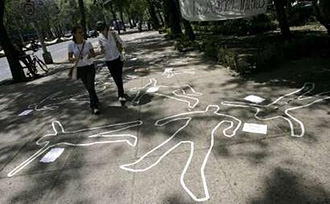
|
 |
 |
 News Around the Republic of Mexico | March 2008 News Around the Republic of Mexico | March 2008  
Mexico Senate Approves Calderon's Anti-Crime Measure
 Jens Erik Gould & Adriana Lopez Caraveo - Bloomberg Jens Erik Gould & Adriana Lopez Caraveo - Bloomberg
go to original


| | Women walk past chalk outlines drawn on the ground in front of the Colombian embassy in Mexico City March 6, 2008, during a protest against violence in Colombia. (Reuters/Daniel Aguilar) | | |
Mexico's Senate approved a bill to revamp criminal laws in an attempt to fix a judicial system crippled by inefficiency, corruption and impunity for authorities suspected of crimes.

The Senate voted 71-to-25 today to pass an initiative central to President Felipe Calderon's efforts to combat drug cartels and temper violence after more than 2,500 trafficking- related deaths last year. It allows lawyers to make oral arguments to speed up trials and lets authorities record private conversations as evidence.

"This will modernize the country's system of delivering justice," said Senator Ulises Ramirez, a member of Calderon's National Action Party.

Human-rights groups say parts of the bill violate individual rights by making it constitutional for prosecutors to enforce house arrest or put suspects in jail before they are charged, a procedure that is already practiced in Mexico.

Under the bill, this would only occur in cases involving suspected organized crime, homicide, or national security. The initiative's definition of organized crime is ambiguous and may lead to arrests without proper guarantees, said Alberto Herrera, executive director of Amnesty International in Mexico.

"We want the judicial system to be efficient, but this can mean permission to violate human rights," Herrera said.

Warrantless Searches

Herrera acknowledges that judicial reform is necessary to fix a system that is inefficient and hasn't held police accountable for human-rights violations.

He praised lawmakers in the lower house for their elimination last week of the bill's most controversial provision, which would have allowed police to search homes without a warrant in life-threatening situations. The Senate also approved the elimination of that provision today.

Supporters of the bill, which Calderon has said he will sign into law, say it will modernize Mexico's judicial system and add transparency. One provision presumes criminal suspects innocent until proven guilty, a departure from current law.

Calderon's victory in pushing the legislation through an opposition-controlled congress comes after he won tax and pension reform proposals. Calderon's predecessor, Vicente Fox, failed to build consensus among lawmakers on such issues.

Calderon said last week that oral arguments will move the Mexican judicial system closer to its U.S. counterpart. The Mexican system currently allows judges to decide cases based on written arguments. Mexico still won't have jury trials.

"The judicial system will be radically transformed," lawmaker Hector Larios Cordova, the leader of the National Action Party in the lower house of Congress, said last week.

Oral Arguments

Larios Cordova said Congress will give authorities eight years to transform courtrooms so they have the capacity to hold oral arguments.

Critics of the bill say this process will take much longer.

"In our country, there aren't the conditions, human or financial resources for a project of this nature," said Jose Luis Soberanes, president of the National Human Rights Commission.

Daniel Lund, president of Mexico City-based polling and consulting firm MUND Americas, said the dire need for judicial changes amid the security crisis has set the bar too low and prompted lawmakers to be satisfied with an insufficient bill.

"The problem is so serious no one knows a decent alternative at this point," Lund said. "The abuses of this reform will be enormous."

Mexico's Ministry of Public Safety has said there were 2,561 violent deaths related to organized crime in the first 11 months of last year.

Detaining Suspects

Herrera of Amnesty International said it was a contradiction that the bill allowed for the presumption of innocence while also letting authorities detain suspects before charging them.

In recent years, authorities haven't opened investigations of policemen who have been accused of charging suspects without access to a lawyer, torturing to get confessions and sexually assaulting female detainees, Herrera said.

"We find arbitrary detention, no due process, torture, and impunity in the whole process," Herrera said. "It has to do with corruption, and also with a lack of training of authorities."

At least 16 states must approve the initiative before Calderon can sign it into law.

To contact the reporter on this story: Adriana Lopez Caraveo in Mexico City at adrianalopez(at)bloomberg.net; Jens Erik Gould in Los Angeles at jgould9(at)bloomberg.net | 
 | |
 |



